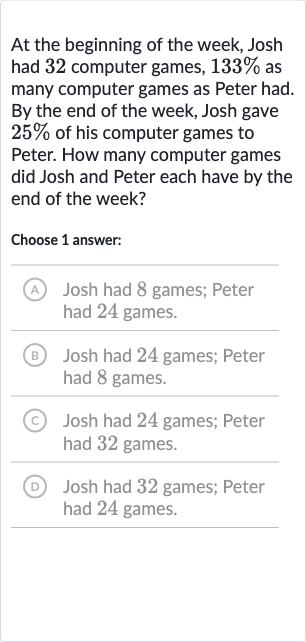AI tutor
Welcome to Bytelearn!
Let’s check out your problem:

At the beginning of the week, Josh had computer games, as many computer games as Peter had. By the end of the week, Josh gave of his computer games to Peter. How many computer games did Josh and Peter each have by the end of the week?Choose answer:(A) Josh had games; Peter had games.(B) Josh had games; Peter had games.(C) Josh had games; Peter had games.(D) Josh had games; Peter had games.
Full solution
Q. At the beginning of the week, Josh had computer games, as many computer games as Peter had. By the end of the week, Josh gave of his computer games to Peter. How many computer games did Josh and Peter each have by the end of the week?Choose answer:(A) Josh had games; Peter had games.(B) Josh had games; Peter had games.(C) Josh had games; Peter had games.(D) Josh had games; Peter had games.
- Determine Initial Games: Determine the number of computer games Peter had at the beginning of the week.Josh had as many computer games as Peter. Let be the number of games Peter had. Then, .Solve for : ., which we round to since the number of games must be a whole number.
- Calculate Games Given: Calculate the number of games Josh gave to Peter.Josh gave away of his games, which is games.
- Calculate Games Left: Determine the number of games Josh had left after giving games to Peter.Josh had games and gave away , so he had games left.
- Calculate Final Games: Determine the number of games Peter had after receiving games from Josh.Peter started with games and received from Josh, so he had games by the end of the week.
More problems from Quantities that combine to zero: word problems
QuestionGet tutor help
QuestionGet tutor help
QuestionGet tutor help
QuestionGet tutor help
QuestionGet tutor help
QuestionGet tutor help
QuestionGet tutor help
QuestionGet tutor help
QuestionGet tutor help
